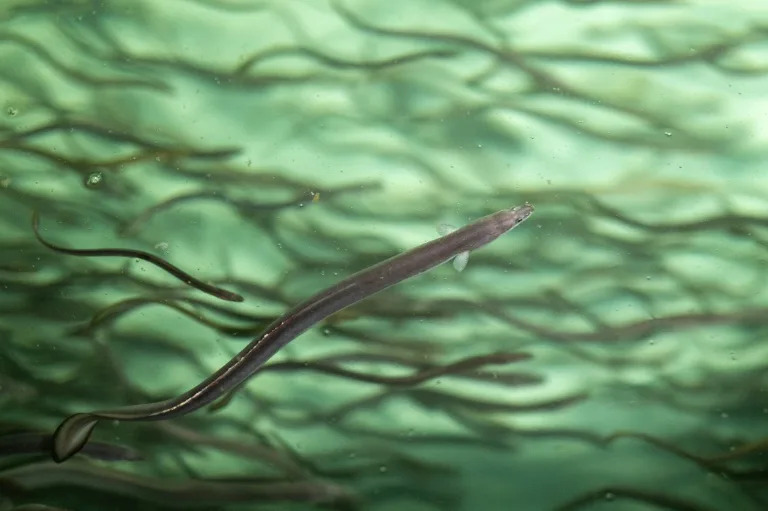World
Wildlife Trade Body Rejects Eel Protections at CITES Meeting

The Convention of International Trade in Endangered Species of Wild Fauna and Flora (CITES) voted on March 14, 2024, to reject proposals for new protections for eels during discussions in Samarkand, Uzbekistan. The decision, made in a secret ballot, faced significant opposition from leading eel-consuming nations, particularly Japan, and from countries concerned about the implications of new trade regulations.
This vote occurred at the CITES meeting, which brings together signatories to regulate trade in over 36,000 species and protect the world’s most endangered flora and fauna. Eel populations globally are experiencing dramatic declines, primarily due to human activities such as pollution, habitat destruction, hydroelectric dam construction, and overfishing. The European eel, in particular, is classified as critically endangered, with trade restrictions imposed by CITES since 2009.
The European Union and Panama had jointly sought to include all 17 eel species under CITES Appendix II, which would enforce stricter trade regulations. The EU representative emphasized the vulnerability of eels, stating, “Every eel we eat comes from the wild, making them vulnerable to overfishing and illegal trade.” The EU’s position highlighted that international trade is a major contributor to the species’ decline.
Japan’s opposition was pronounced, labeling the proposal as unscientific and excessive. Several African nations supported Japan, citing concerns about the administrative burdens the new regulations would impose on their governments. The secret ballot procedure indicated the contentious nature of the issue, with nearly 75 percent of votes against the protective measures.
Oliver Tallowin, a senior programme officer for wildlife use and trade at the International Union for the Conservation of Nature, remarked that the outcome was anticipated. He noted that there are varying opinions on the extent of the threats posed by international trade to different eel species, complicating the argument for stronger protections. “International trade has to be a threat to the species and… that was something we couldn’t say with any sense of certainty,” he explained.
Andrew Kerr from the Sustainable Eel Group criticized the decision, describing eel trafficking as the “greatest wildlife crime” on the planet. He expressed disappointment over the vote’s outcome but also recognized some positive aspects. A separate resolution advocating for enhanced data collection on eels and capacity-building for conservation efforts is set to be debated during the ongoing talks.
Kerr noted, “We’ve had a missed opportunity this morning, but the fact that everyone’s talking about eel, that’s a huge victory too.” The proposed resolution could pave the way for improved protections for all eel species in the future. Tallowin added, “Once something has been rejected… that doesn’t mean it’s going to go away.”
As the CITES meeting progresses, final decisions will be confirmed, though it is uncommon for outcomes to be revisited. The rejection of the eel protections underscores the ongoing challenges in balancing economic interests with conservation efforts in the face of declining wildlife populations.
-

 Lifestyle4 months ago
Lifestyle4 months agoLibraries Challenge Rising E-Book Costs Amid Growing Demand
-

 Sports4 months ago
Sports4 months agoTyreek Hill Responds to Tua Tagovailoa’s Comments on Team Dynamics
-

 Sports4 months ago
Sports4 months agoLiverpool Secures Agreement to Sign Young Striker Will Wright
-

 Lifestyle4 months ago
Lifestyle4 months agoSave Your Split Tomatoes: Expert Tips for Gardeners
-

 Lifestyle4 months ago
Lifestyle4 months agoPrincess Beatrice’s Daughter Athena Joins Siblings at London Parade
-

 World4 months ago
World4 months agoWinter Storms Lash New South Wales with Snow, Flood Risks
-

 Science3 months ago
Science3 months agoSan Francisco Hosts Unique Contest to Identify “Performative Males”
-

 Science4 months ago
Science4 months agoTrump Administration Moves to Repeal Key Climate Regulation
-

 Business4 months ago
Business4 months agoSoFi Technologies Shares Slip 2% Following Insider Stock Sale
-

 Science4 months ago
Science4 months agoNew Tool Reveals Link Between Horse Coat Condition and Parasites
-

 Sports4 months ago
Sports4 months agoElon Musk Sculpture Travels From Utah to Yosemite National Park
-

 Science4 months ago
Science4 months agoNew Study Confirms Humans Transported Stonehenge Bluestones









